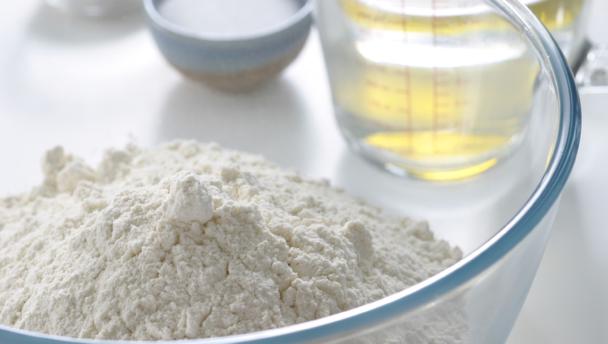

This is low-protein, low-gluten white or wholemeal flour with a raising agent mixed in. The most usual raising agent added is baking powder, but some brands also use bicarbonate of soda or other agents.
 Beef and chorizo with horseradish mash and rosemary dumplings
Beef and chorizo with horseradish mash and rosemary dumplings
 Beef stew with light herby dumplings
Beef stew with light herby dumplings
 Beef and ale stew with dumplings
Beef and ale stew with dumplings
 Somerset chicken casserole with sage dumplings
Somerset chicken casserole with sage dumplings
 Beef and ale stew with dumplings
Beef and ale stew with dumplings
 Fruity fritters
Fruity fritters
 Spinach and cheese samosas
Spinach and cheese samosas
 Snowman pancakes with orange and spice
Snowman pancakes with orange and spice
 Spring onion, potato and cheese fritters with quick pickled beetroot
Spring onion, potato and cheese fritters with quick pickled beetroot
 Gingerbread pancakes with Parma ham and maple syrup
Gingerbread pancakes with Parma ham and maple syrup
 Vegetable pakoras
Vegetable pakoras
 Tempura scallops and asparagus with ponzu dressing
Tempura scallops and asparagus with ponzu dressing
 Salt fish fritters
Salt fish fritters
 Baked Welsh cake cheesecake
Baked Welsh cake cheesecake
 Easy sticky toffee pudding with toffee sauce
Easy sticky toffee pudding with toffee sauce
 Jam roly-poly
Jam roly-poly
 Vanilla cupcakes
Vanilla cupcakes
 How to make fairy cakes
How to make fairy cakes
 Celebration chocolate cake
Celebration chocolate cake
 Rich scones
Rich scones
 Lemon drizzle traybake
Lemon drizzle traybake
Self-raising flour is widely available in UK supermarkets. Outside of the UK and USA, it is not commonly used.
Self-raising flour will not keep for very long. The baking powder absorbs moisture from the air, which reacts with other ingredients in the flour, affecting its ability to rise.
Self-raising flour is used in baking and cake-making, and is often an ingredient in packaged cake mixes. If you do not have self-raising flour, combine plain flour with baking powder and salt, or add raising agents separately in your recipe. Self-raising flour is often used as a short-cut in baking, or by vegans who do not eat eggs (the extra raising agent in the flour does the eggs’ work).
Article by Sejal Sukhadwala
Type the ingredients you want to use, then click Go. For better results you can use quotation marks around phrases (e.g. "chicken breast"). Alternatively you can search by chef, programme, cuisine, diet, or dish (e.g. Lasagne).